Upasana Makati, the visionary founder of White Print, has carved a unique space in India’s media and social impact landscape. She is widely recognized for launching India’s first lifestyle magazine in Braille, a bold initiative that combines fashion, culture, and accessibility, making lifestyle content inclusive for the visually impaired community.
A Trailblazer in Braille Media
White Print stands out as the first lifestyle magazine designed specifically for Braille readers in India, providing the visually impaired access to the same cultural, fashion, and lifestyle insights that sighted audiences enjoy. Through her work, Upasana Makati has not only addressed a glaring gap in media accessibility but has also redefined how inclusive publishing can be implemented in a mainstream context.
The magazine covers a wide array of topics—ranging from fashion, art, and wellness to travel and entertainment—ensuring that visually impaired readers can engage with contemporary lifestyle trends just like anyone else. By making such content accessible, Upasana has given a voice to a community that has historically been underserved in the publishing and media sectors.
Championing Disability Inclusion
Beyond media, Upasana Makati is a major voice in disability inclusion in India. She actively advocates for equal opportunities, awareness, and representation for people with disabilities across industries, particularly in education, media, and corporate sectors. Her work highlights the importance of accessibility in every aspect of society, from information dissemination to workplace inclusion.
Upasana’s leadership in disability inclusion extends beyond White Print. She frequently speaks at conferences, participates in panel discussions, and collaborates with organizations to promote policies that empower individuals with disabilities. Her efforts have inspired many startups and media houses to consider inclusive content creation as a standard rather than an exception.
Impact and Recognition
The launch of White Print has had a transformative impact on India’s visually impaired community. By providing accessible lifestyle content, the magazine helps promote confidence, creativity, and social engagement among readers. Upasana Makati’s vision also contributes to breaking societal stereotypes around disability, showing that people with visual impairments can enjoy, participate in, and contribute to mainstream culture.
Her work has garnered attention from media outlets, social organizations, and government initiatives aimed at promoting inclusive practices. Upasana is increasingly recognized not just as a publisher but as a social innovator and advocate for equity and accessibility.
Conclusion
Upasana Makati’s journey is a testament to how passion, innovation, and empathy can create meaningful social change. Through White Print, she has not only transformed the media landscape for visually impaired individuals in India but has also become a powerful voice for disability inclusion. Her pioneering efforts demonstrate that accessibility and inclusivity are not optional—they are essential, inspiring a new generation of entrepreneurs, media professionals, and social advocates to think inclusively.
🔥 SEO-Friendly Keywords & Tags
Upasana Makati, White Print Magazine, Braille Magazine India, Disability Inclusion India, Accessible Media, Inclusive Lifestyle Magazine, Social Impact Startups India, Media for Visually Impaired, Indian Women Entrepreneurs, Braille Media, Accessibility Advocate India, Inclusive Publishing, Disability Rights, Empowering Visually Impaired


